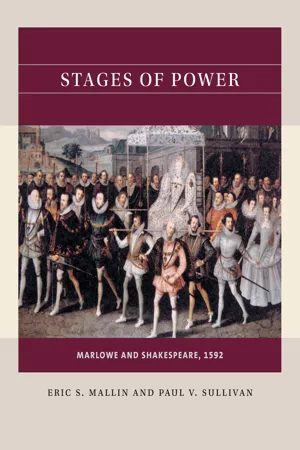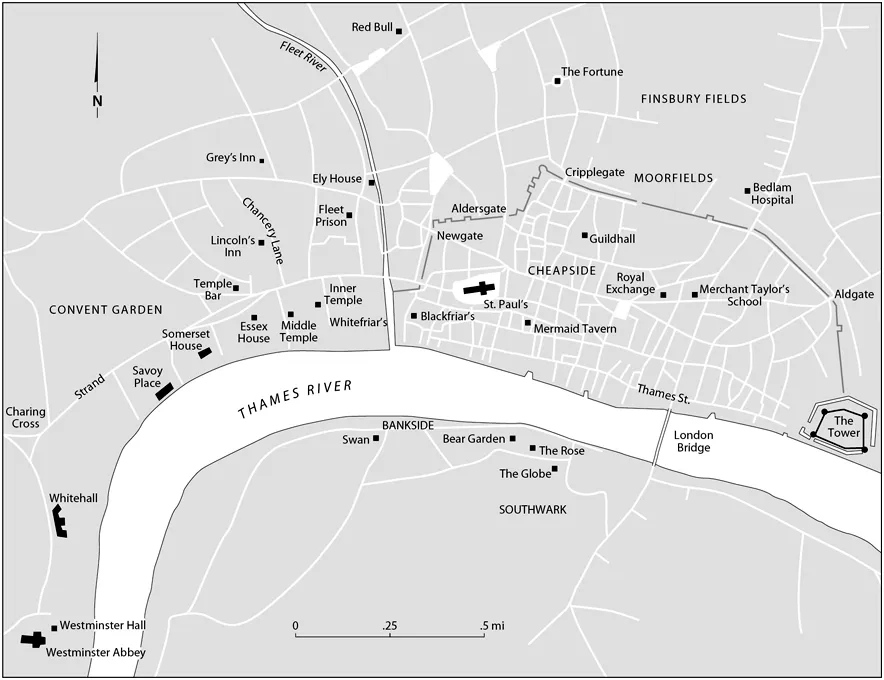1
Introduction
BRIEF OVERVIEW OF THE GAME
This game enacts artistic, political, moral, and religious conflicts in England in the autumn of 1592. These conflicts play out in a contest between two rival acting companies for a license to perform one of two plays: Christopher Marlowe’s Tragical History of Doctor Faustus (or another of his plays, as chosen by the game master) or William Shakespeare’s Richard III (or one of his other early plays).
Christopher Marlowe is the most successful playwright in the city, and his acting company, the Lord Admiral’s Men, is eager to stage one of his plays. The theaters have been closed since June because of an outbreak of bubonic plague. Actors are anxious about their livelihoods, and they want a winning script. The manager of the theater where the Lord Admiral’s Men perform would ordinarily be happy to produce any Marlowe play, but some of his themes are potentially controversial, and City officials are skittish. They remember too well decades of violent collisions between Protestants and Catholics and continuing factional rivalries between noblemen and courtiers. Now there are new rumblings of Puritan discontent and foreign meddling in affairs of state. There are even rumors that Marlowe is an atheist.
The Queen’s master of the revels will not allow mere scribblers to threaten the fragile balance of public order. Might there be a safe and profitable alternative to Marlowe? A rival company, Lord Strange’s Men, has had some success with the plays of a young actor named William Shakespeare, and he has a new script to offer now. Strange’s Men are an able troupe, and they have performed the young poet’s work to some acclaim. But will Marlowe’s play survive official scrutiny in these nervous times? Perhaps more important, will it win audiences? While the theater manager waffles, the Queen’s Privy Council has agreed to oversee a contest between the Lord Admiral’s Men and Lord Strange’s Men to decide which troupe will be licensed to reopen the playhouses. Which actors are better, and which play? Which will best represent the nation’s ideals, energies, humor, and grandeur without overt offense to political or religious order?
The players have an impressive command of texts and traditions that inform Elizabethan struggles of religion, rank, and power, struggles that were moved by the dynamics of dramatic spectacle, eloquent speech, and ruthless scheming. In debate and in performance before the Privy Council, the rival companies play out the dramas of their age: lofty humanist ideals and poetic art take wing in the theater, only to be brought to earth by the pragmatic rhetoric of the City and the cynical, secretive maneuverings of the court and Privy Council. By the end of the game, one troupe will gain supremacy (fleeting though it may be) and win a license to play at the Rose Theatre, thereby increasing their fortunes.
HOW TO PLAY THIS GAME
This is a “reacting” game. Reacting games are historical role-playing games in which students take on assigned characters to learn about moments in history. After a few preparatory lectures, the game begins and the students are in charge. Set in moments of heightened historical tension, the games place students in the roles of historical figures. By reading the game book and their individual role sheets, students discover their objectives, potential allies, and the forces that stand between them and victory. They must then attempt to achieve victory through formal speeches, informal debate, negotiations, and (sometimes) conspiracy. Outcomes sometimes part from actual history; a postmortem session sets the record straight.
The following is an outline of what you will encounter in this game and what you will be expected to do.
Game Setup
Your instructor will spend some time before the beginning of the game helping you to understand its historical context. During the setup period, you will use several different kinds of material:
- The game book (from which you are reading now), which includes historical information, rules and elements of the game, and essential documents.
- A role sheet, provided by the instructor, which gives a short biography of the historical figure you will model in the game as well as that person’s ideology, objectives, responsibilities, and resources. Your role may be an actual historical figure or a composite.
In addition to the game book, you may also be required to read historical documents or literary criticism. These provide additional information and arguments for use during the game.
Read all of this material and all of these documents and sources before the game begins. And, just as important, go back and reread these materials throughout the game. A second and third reading while in role will deepen your understanding and alter your perspective, for ideas take on a different aspect when seen through the eyes of a partisan actor.
Students who have carefully read the materials and who know the rules of the game will invariably do better than those who rely on general impressions and uncertain memories.
Game Play
Once the game begins, class sessions are presided over by students. In most cases, a single student serves as a kind of presiding officer. The instructor then becomes the game master (GM) and takes a seat in the back of the room. Though they do not lead the class sessions, GMs may do any of the following:
- Pass notes.
- Announce important events. Some of these events are the result of student actions; others are instigated by the GM.
- Redirect proceedings that have gone off track.
The GM is expected to observe basic standards of fairness, but as a fail-safe device, this game employs the “Podium Rule,” which allows a student who has not been recognized to approach the podium and wait for a chance to speak. Once at the podium, the student has the floor and must be heard.
Role sheets contain private, secret information that students are expected to guard. You are advised, therefore, to exercise caution when discussing your role with others. Your role sheet probably identifies likely allies, but even they may not always be trustworthy. However, keeping your own counsel, or saying nothing to anyone, is not an option. In order to achieve your objectives, you must speak with others. You will never muster the voting strength to prevail without allies. Collaboration and coalition building are at the heart of every game.
These discussions must lead to action, which often means proposing, debating, and passing legislation or petitions of various kinds. Always remember that this game is only a game—resistance, attack, and betrayal are not to be taken personally, since game opponents are merely acting as their roles direct.
Some games feature strong alliances called factions; these are tight-knit groups with fixed objectives. Games with factions all include roles called Indeterminates. They operate outside the established factions. Not all Indeterminates are entirely neutral; some are biased on certain issues. If you are in a faction, cultivating Indeterminates is in your interest, since they can be convinced to support your position. If you are lucky enough to have drawn the role of an Indeterminate, you should be pleased; you will likely play a pivotal role in the outcome of the game.
Game Requirements
Players will practice persuasive writing, public speaking, critical thinking, teamwork, negotiation, problem solving, collaboration, adapting to changing circumstances, and working under pressure to meet deadlines. Your instructor will explain the specific requirements for your class. In general, though, this game asks you to perform three distinct activities:
Reading and Writing. This standard academic work is carried on more purposefully in a role-playing game, since what you read is put to immediate use, and what you write is meant to persuade others to act the way you want them to. The reading load may have slight variations from role to role; the writing requirement depends on your particular course. Papers are often policy statements, but they can also be autobiographies, battle plans, spy reports, newspapers, poems, or after-game reflections. Papers provide the foundation for the speeches delivered in class.
Public Speaking and Debate. In the course of a game, almost everyone is expected to deliver at least one formal speech from the podium (the length of the game and the size of the class will determine the number of speeches). Debate follows. Debate can be impromptu, raucous, and fast paced, and results in decisions voted on by the body. GMs may stipulate that students must deliver their papers from memory when at the podium, or may insist that students wean themselves from dependency on written notes as the game progresses.
Wherever the game imaginatively puts you, it will surely not put you in the classroom of a twenty-first-century American college. Accordingly, the colloquialisms and familiarities of today’s college life are out of place. Never open your speech with a salutation like “Hi guys” when something like “Fellow citizens!” would be more appropriate.
Never be friendless when standing at the podium. Do your best to have at least one supporter second your proposal, come to your defense, or admonish inattentive members of the body. Note-passing and side conversations, while common occurrences, will likely spoil the effect of your speech, so you and your supporters should insist on order before such behavior becomes too disruptive. Ask the presiding officer to assist you, if necessary, and the GM as a last resort.
Strategizing. Communication among students is an essential feature of this game. You will find yourself writing e-mails, texting, attending out-of-class meetings, or gathering for meals on a fairly regular basis. The purpose of frequent communication is to lay out a strategy for advancing your agenda and thwarting the agenda of your opponents, and to hatch plots to ensnare individuals troubling to your cause. When communicating with a fellow student in or out of class, always assume that he or she is speaking to you in role. If you want to talk about the “real world,” make that clear.
COUNTERFACTUALS
Troupes of actors would not have commingled with the Privy Council as they do in this game.
Essex was not named to the council until 1593, but we will imagine for the purposes of this game that he is already there, named to the chamber shortly after the younger Cecil in 1592.
. Puritan: According to the Oxford English Dictionary, this term first appeared in the 1560s. It originally meant “a member of a group of English Protestants of the late 16th and 17th centuries, who regarded the reformation of the Church under Elizabeth I as incomplete and sought to remove any remaining elements of church practice (such as ceremonies, church ornaments, the use of musical instruments, and in some cases episcopal authority) which they consider...

